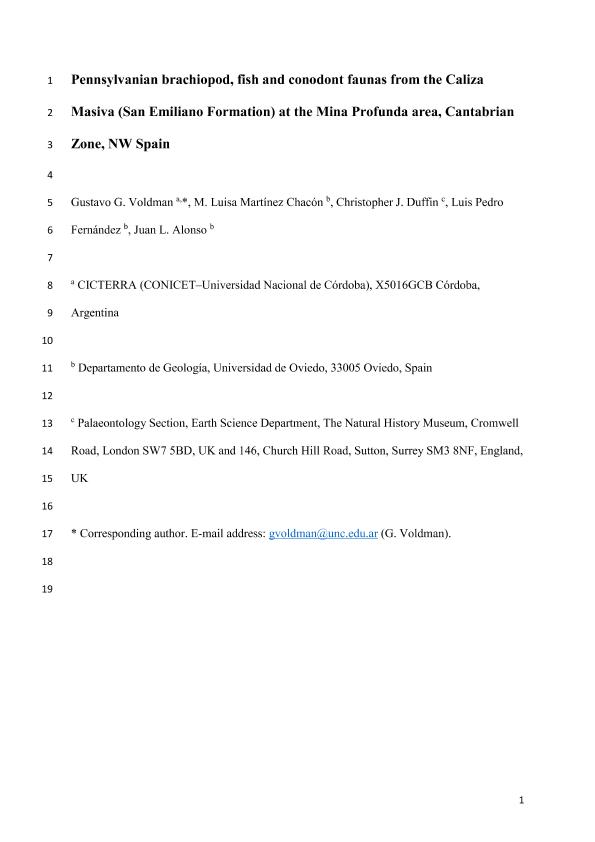Mostrar el registro sencillo del ítem
dc.contributor.author
Voldman, Gustavo Gabriel

dc.contributor.author
Martínez Chacón, María Luisa
dc.contributor.author
Duffin, Christopher J.
dc.contributor.author
Fernández, Luis Pedro
dc.contributor.author
Alonso, Juan L.
dc.date.available
2021-09-20T19:27:39Z
dc.date.issued
2020-04
dc.identifier.citation
Voldman, Gustavo Gabriel; Martínez Chacón, María Luisa; Duffin, Christopher J.; Fernández, Luis Pedro; Alonso, Juan L.; Pennsylvanian brachiopod, fish and conodont faunas from the Caliza Masiva (San Emiliano Formation) at the Mina Profunda area, Cantabrian Zone, NW Spain; Elsevier France-Editions Scientifiques Medicales Elsevier; Geobios; 59; 4-2020; 91-106
dc.identifier.issn
0016-6995
dc.identifier.uri
http://hdl.handle.net/11336/140926
dc.description.abstract
A rock sample obtained from the Caliza Masiva of the San Emiliano Formation (Bashkirian–early Moscovian) in the Mina Profunda area (NE Villamanín) of the Bodón Nappe (Cantabrian Zone, NW Spain) has yielded numerous brachiopods and fish remains not frequently represented in the fossil record. The brachiopod assemblage comprises 13 taxa and is characterized by phosphatic (Langella, Orbiculoidea) as well as exceptionally preserved silicified calcitic elements (a small chonetid, Composita, Crurithyris, Lambdarina, and two minute terebratulids) as the main faunal components. Of special importance is the record of the microbrachiopod Lambdarina winklerprinsi nov. sp., which reduces the large Viséan–Upper Permian gap in the stratigraphic record of this genus. Conodont elements recovered from the same insoluble residue are indicative of the upper Bashkirian Idiognathoides sulcatus parvus Zone. The accompanying fish remains consist of chondrichthyan teeth and scales, an acanthodian scale and osteichthyan tooth-bearing bones, isolated teeth and isolated scales, representing the first Pennsylvanian ichthyoliths analyzed from the Cantabrian Zone. The limestone beds with selective silicification in the San Emiliano Formation provide an exceptional opportunity to improve our knowledge on the patterns of life diversity over geological time.
dc.format
application/pdf
dc.language.iso
eng
dc.publisher
Elsevier France-Editions Scientifiques Medicales Elsevier

dc.rights
info:eu-repo/semantics/openAccess
dc.rights.uri
https://creativecommons.org/licenses/by-nc-nd/2.5/ar/
dc.subject
BRACHIOPOD
dc.subject
CONODONT
dc.subject
ICHTHYOLITH
dc.subject
NW SPAIN
dc.subject
PENNSYLVANIAN
dc.subject
SAN EMILIANO FORMATION
dc.subject.classification
Paleontología

dc.subject.classification
Ciencias de la Tierra y relacionadas con el Medio Ambiente

dc.subject.classification
CIENCIAS NATURALES Y EXACTAS

dc.title
Pennsylvanian brachiopod, fish and conodont faunas from the Caliza Masiva (San Emiliano Formation) at the Mina Profunda area, Cantabrian Zone, NW Spain
dc.type
info:eu-repo/semantics/article
dc.type
info:ar-repo/semantics/artículo
dc.type
info:eu-repo/semantics/publishedVersion
dc.date.updated
2021-09-06T15:13:50Z
dc.journal.volume
59
dc.journal.pagination
91-106
dc.journal.pais
Francia

dc.journal.ciudad
París
dc.description.fil
Fil: Voldman, Gustavo Gabriel. Consejo Nacional de Investigaciones Científicas y Técnicas. Centro Científico Tecnológico Conicet - Córdoba. Centro de Investigaciones en Ciencias de la Tierra. Universidad Nacional de Córdoba. Facultad de Ciencias Exactas Físicas y Naturales. Centro de Investigaciones en Ciencias de la Tierra; Argentina
dc.description.fil
Fil: Martínez Chacón, María Luisa. Universidad de Oviedo; España
dc.description.fil
Fil: Duffin, Christopher J.. Natural History Museum; Reino Unido
dc.description.fil
Fil: Fernández, Luis Pedro. Universidad de Oviedo; España
dc.description.fil
Fil: Alonso, Juan L.. Universidad de Oviedo; España
dc.journal.title
Geobios

dc.relation.alternativeid
info:eu-repo/semantics/altIdentifier/doi/http://dx.doi.org/10.1016/j.geobios.2020.03.004
dc.relation.alternativeid
info:eu-repo/semantics/altIdentifier/url/https://www.sciencedirect.com/science/article/abs/pii/S0016699520300097
Archivos asociados
